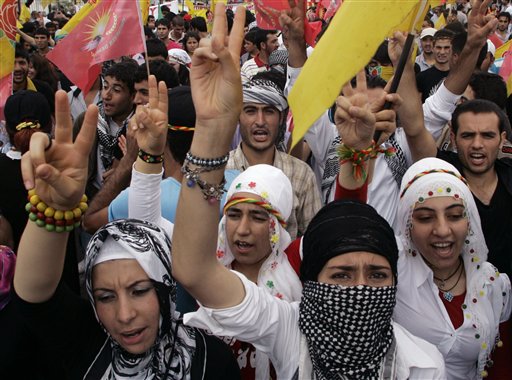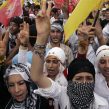
Resolution of Turkey’s “Kurdish Question” in Critical Stage as PKK Threatens to End Peace Initiatives
Publication: Terrorism Monitor Volume: 8 Issue: 7
By:

Last October, eight unarmed Kurdish militants and 28 Kurdish civilians returned to southeast Turkey from bases of the Parti Karkerani Kurdistan (Kurdistan Workers’ Party – PKK) in northern Iraq. It was intended as the first of a series of government-sponsored “returns” of PKK activists and part of a larger scheme of reconciliation between the Kurdish militants and the state. When Kurdish activists in Turkey organized a massive parade for the returnees that looked more like a victory march, the ensuing public relations disaster brought the government’s repatriation scheme to a halt. Progress on the “Kurdish Initiative” (the government’s comprehensive approach to resolving the Kurdish issue) quickly dissipated as a result of public reaction to the massive welcoming ceremony.
The Kurdish initiative began to collapse when it became the foundation of an ethnic confrontation that erupted in street violence. While the opposition parties agitated the Turkish public against the Kurdish initiative, the Kurdish nationalist Demokratik Toplum Partisi (Democratic Society Party – DTP) organized several political rallies to protest the new prison conditions of imprisoned PKK leader Abdullah Ocalan, further escalating the division between the Turkish and Kurdish people (see Terrorism Monitor, December 3, 2009).
Who’s Behind the Street Violence?
Turkish counterterrorism units believe that the violence in the Kurdish region is organized by the Koma Civaken Kurdistan (Peoples’ Confederation of Kurdistan – KCK), an umbrella organization that combines pro-PKK organizations and aims to mobilize Kurdish youth in city centers whenever Ocalan orders it. To end the street violence, police raided various addresses and arrested approximately 100 KCK members, including human rights activists, politicians, students and ten mayors (Sabah, December 25, 2009). The police raid on KCK militants disappointed many Kurdish and Turkish intellectuals who supported the Kurdish initiative. In addition to the police operations against Kurdish nationalist activists, the Constitutional Court finalized a two-year long court case against the Kurdish nationalist DTP, shutting the party down because of its ties with PKK terrorists (ntvmsnbc.com, December 11, 2009).
Both Turks and Kurds were disappointed with the immediate results of the Kurdish initiative. In order to placate Turkish public anger the government slowed down the initiative’s implementation. In recent weeks, however, there are signs that the government is going to resume the Kurdish initiative to end the ethnic violence. Interior Minister Besir Atalay held a press conference on January 15 to restate that the government is determined to finalize the Kurdish initiative (Akparti.org.tr, January 15). Furthermore, the ruling Adalet ve Kalkinma Partisi (Justice and Development Party – AKP) sent out a handbook to the local branches of the AKP explaining the government’s aims behind the Kurdish initiative (Hurriyet, January 22).
Reviving the Kurdish Initiative
The AKP also invited public figures, including singers, artists, writers, and celebrities to a meeting with Prime Minister Recep Tayyip Erdogan to discuss the Kurdish initiative. The AKP government believes that celebrities and intellectuals could help the government reach out to the larger segments of Turkish society to convince them that the Kurdish initiative is a necessary step to solving the ongoing problem (Zaman, February 6).
The AKP has also invited a delegation from the Council of Europe’s Committee for the Prevention of Torture (CPT) to examine the prison conditions of Abdullah Ocalan and five other inmates. The Turkish press reported that the delegation had the opportunity to ask questions of Ocalan and the other inmates (Cihan Haber Ajansi, January 27). The government’s aim in inviting the CPT delegation was to reduce existing tensions based on the speculation that Ocalan’s new prison conditions do not correspond to international human rights standards.
With regard to how to deal with the PKK members still in northern Iraq, the Turkish government invited the Commanding General, United States Forces – Iraq, General Ray Odierno, to discuss possible measures. General Odierno had a meeting with Interior Minister Besir Atalay and discussed details of how to evacuate the Mahmur U.N. refugee camp, where 10,000 Turkish Kurd refugees have been residing since 1993. Mahmur is a major source of recruitment for the PKK and its closure will be an important part of any peace settlement (Hurriyet, February 4).
New Parties, New Politics?
While the Turkish government undertakes a comprehensive public campaign to explain why it is necessary to address the Kurdish question, the Kurdish opposition is sending mixed signals regarding cooperation with the government. After the DTP’s closure, the Kurdish nationalist parliamentary deputies formed a new political party, Bedis ve Demokrasi Partisi (Peace and Democracy Party – BDP), to continue their political life. PKK leader Abdullah Ocalan warned the BDP leaders not to associate with the PKK or be its spokesman but rather to work in the legal arena (Gundem-online.net, February 4). This is a new approach in Kurdish politics. In the last 20 years of the Kurdish struggle a succession of pro-PKK parties have always acted as if they were the spokesman of the PKK. These ties with the PKK have become a major point of contention between the Kurdish nationalist movement and the European Union (E.U.) since 2004. E.U. representatives have unsuccessfully asked DTP politicians to distance themselves from the PKK.
The new Kurdish BDP party, however, follows a new path. Following Ocalan’s advice, BDP leader, Selehattin Demirtas declared, “The PKK and the BDP are two separate organizations. If the PKK want to say something they have the right to say so. We will not be their voice” (aktifhaber.com, February 6). In a recent interview Selehattin Demirtas thanked Ocalan for allowing the BDP to develop its own political program as an independent party from the PKK (ANF News Agency, February 4).
Parallel to these developments, the PKK’s acting leader, Murat Karayilan, has issued a statement presenting three principles and four steps to end the violence. Karayilan thinks that a peace settlement based on these principles will require a new Turkish constitution.
The three principles that Karayilan believes are the basis of a potential peace agreement are:
• A “democratic nation” in which no ethnic group and identity is dominant and privileged.
• A “democratic country” which accepts the fact that the country belongs to all ethnic groups
• A “democratic republic” which acknowledges the national and democratic rights of all ethnic groups.
Karayilan’s four steps to bringing peace:
• Both the PKK and the Turkish military need to declare a ceasefire. The Turkish state should stop military and political operations against the PKK.
• The local politicians who were arrested as part of operations against the KCK since April 14, 2009 should be released immediately.
• Abdullah Ocalan should be released from prison and put under house arrest.
• Negotiations between the Kurdish political leaders and the government should begin (ANF News Agency, February 3).
PKK leaders have issued similar demands in the past and Karayilan’s principles reflect the position the PKK has adopted since 1999. The core demand remains recognition of the PKK as a legitimate representative of the Kurdish people in Turkey.
The Kurdistan Freedom Falcons
Parallel with Cemil Bayik’s statement, the Kurdistan Freedom Falcons (Teyrebazen Azadiya Kurdistan – TAK) issued a new declaration. The TAK is an offshoot PKK organization that concentrated its attacks in major metropolises and tourism destinations in 2006 and 2007, but stopped the attacks in 2008 (see Terrorism Focus, October 17, 2006; January 22, 2008). In January 2008 the TAK was added to the U.S. list of designated terrorist organizations. In its declaration the TAK threatens to resume its terror campaign in major metropolises. As a target the TAK names the major Turkish political parties: the AKP, the Nationalist Action Party (Milliyetci Hareket Partisi – MHP) and the Republican Peoples Party (Cumhuriyet Halk Partisi – CHP). In addition to these targets the TAK threatened to hit economic targets and civilians who play critical roles in maintaining the existing political system. TAK further warns tourists not to come to Turkey.
The TAK accuses the PKK of being passive in its fight with the Turkish state, but is leaving the door open to cooperate with the PKK if it agrees to intensify its struggle (teyrenkurdistan.com, January 24).
Conclusion
Given that the TAK was formed by PKK leader Murat Karayilan and commanded by Dr. Bahoz Erdal (a.k.a. Fehman Hussein, the former commander of PKK military units), it is unlikely to organize an intense terror campaign in Turkish metropolises if the PKK leaders, particularly Ocalan, do not approve their strategy. Thus, the TAK’s public statement cannot be considered an independently-issued declaration. Rather, it could be a tactical maneuver on behalf of the PKK to convince the AKP government it needs to recognize the PKK as a reasonable negotiating partner. As it watches how the AKP’s Kurdish initiative unfolds, the PKK will retain the option of playing its TAK card if it thinks further violence will serve the PKK’s organizational interests.





